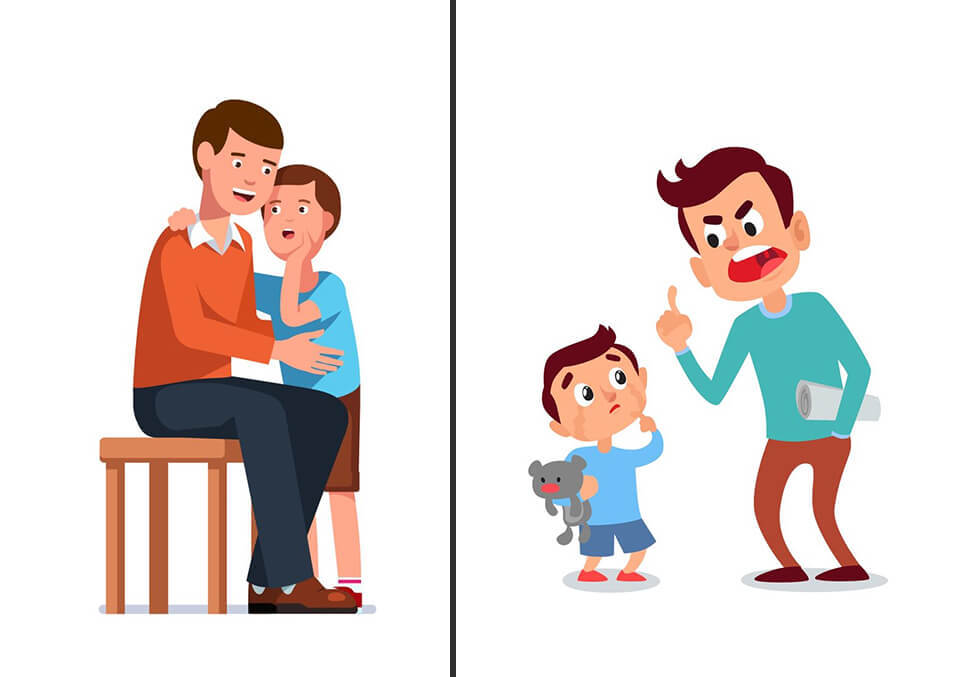Baumrind parenting, human behavior does not lend itself to strict classification; the same applies to parent styles. But almost fifty years ago, a group of researchers led by Diane Baumrind derived four basic approaches from the observation of many families that most parents use. The same four approaches, slightly improved, are still used by most child development specialists to determine the types of parental behavior. Can you find yourself in one of the descriptions of these approaches?
1. An Authoritarian Approach

These parents have great expectations from the children, which in itself is good. Their children receive good grades, are responsible, are able to manage themselves and do not fall into alterations. The problem is that such parents do not really support their children. Their requirements are high: pull yourself together and work, as I said or nothing. Such parents were also brought up in this way, and they think that everything is fine with them, but their children often become rebels in their teens. In addition, they are more influenced by peer groups because they are not used to thinking independently and taking responsibility for their behavior, and also because children who have not received enough support at home are looking for love elsewhere.
2. A Custodial (All permissive) Approach
Most of these Baumrind parentings are very careful not to repeat the mistakes of their tough parents, and therefore they go too far in the opposite direction. They give their children a lot of support, which of course they need.
But with this approach, two problems arise. Firstly, parents who use this approach often make it clear to children that disappointment, grief, pain, and other negative emotions should be avoided by any means. It is difficult for their children to understand that one can meet with misfortune, but be happy again, and this is necessary for the development of stamina and cheerfulness. And secondly, with this approach, adults avoid restrictions and high expectations. Some of them believe that it is better not to interfere with the natural course of development of their children. Others simply cannot bear it when their children are upset, because they themselves are not able to cope with their anxieties and anxieties.
But for children who have never had to limit their desires or cope with a difficult task in order to meet high expectations, it is difficult to develop independence and self-discipline. Do not get me wrong – there is not too much respect and empathy for the child. But if you allow your child to step over your needs or the needs of other people, then what kind of relationships with people do you teach him? By educating in this way, you will grow them self-centered, anxious and not very resilient.
3. A Neglectful (Inattentive) Approach

Baumrind parenting is prone to this type, who cannot give their children the love and attention they need because of alcoholism, narcissism, or the need to work two jobs to support a family. But now this style is increasingly prevailing, at least in some cultures, where the need to educate children in kindergarten from a young age is rationalized. As they grow older, the child lives his own life, and by the teenage period, we have practically no influence on him.
For a child, this is always a signal that he is not worth the love and attention, and if both parents do not want to deal with him, then a lack of intimacy often leads to high anxiety, drug or alcohol addiction, or other problems.
4. Confidence-Based Approach

Parents using this approach, according to baumrind parenting styles, raise the most adopted children. Respectful, not authoritarian, they give children a lot of love and support, as with the permissive approach. But they expect a lot from them, as do authoritarian parents. Of course, their expectations correspond to the age and personality of the child, they do not require a three-year-old baby to clean his room on his own. But they will clean his room with him again and again, so by the age of six, he will really learn how to do it on his own.
These parents are very attentive, even demanding. They want joint dinners, good grades, responsible behavior, confidential communication in high school. And they give the child full support and assistance in meeting his needs and meeting these expectations. It is important to note that this Baumrind parenting does not control him, as in an authoritarian family.
They listen to the child’s point of view, compromise and, where possible, give him control over his life. It is not surprising that their children remain close to them – during surveys they often call mom or dad as the first person with whom they would discuss their problems. Such children usually have high achievements at school, and teachers describe them as responsible, beloved, just good, attentive children with whom it is pleasant to be together.
Can You See How This Affects Everyday Life?

For example, your eight-year-old son brought home a bad grade.
Authoritarian Parent:
yells at the child and does not let him out until he corrects the grade. The end of the discussion. Perhaps a tutor will be hired, which will be presented as a punishment or a replacement for your favorite pastime, for example, a game of basketball. The boy is left alone with his anger, without motivation, and must decide for himself how to correct the assessment.
Guardian Parent:
listens with sympathy. He believes the child if he says that this is the teacher’s fault, and asks the next time to be more careful. He can tell the child that he believes in him, and even advise him to work more seriously, but he will not offer real help, for example, in the form of a new structure for studying the subject, which will allow him to really master this knowledge and skills.
The difference between this approach and permissive, custodial, is that there are higher expectations from the child and the ability to regulate their own anxieties, so he gets enough support to cope with a difficult task. And the difference in the involvement of parents in the upbringing process is also obvious: the parents of the fourth type are most involved. Perhaps that is why they are the happiest.
Read Also:
- All You Should Know About Neglectful Parenting.
- Parenting: Birth Accompaniment For The Father.
- Positive Parenting: Is it The Effective Approach?


